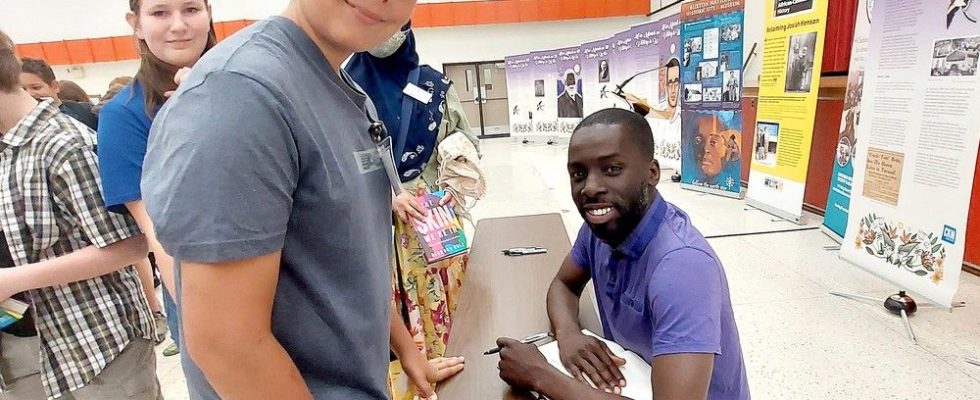Racism is a tough subject, but journalist, activist and author Desmond Cole believes talking about it is key to stopping it.

Racism is a tough subject, but journalist, activist and author Desmond Cole believes talking about it is key to stopping it.
The author of the acclaimed book, The Skin We’re In, which focuses on Black resistance and organizing movements today in Canada, was keynote speaker at the 2023 Youth Diversity Symposium attended by 120 seventh- and eight-graders from across the Lambton Kent District school board.
In his address Tuesday at Lambton Kent composite school in Dresden, Cole said he tries to tie the historical realities of how Black people fought back against oppression to what’s happening today.
“But let’s also recognize history is still here with us today, there’s still a fight happening, there’s still discrimination and oppression happening and we’re still struggling against that,” he said.
Cole was impressed by the students’ knowledge of the Underground Railroad and the oppression of Indigenous children in residential schools.
“They’re actually learning a lot more things than I did when I was growing up,” he said.
But students didn’t seem to know much about the earlier history, including that there was slavery in Canada for many years before it was abolished, he added.
Students are good at drawing parallels to enslavement, particularly when it comes to the disproportionate number of Black people imprisoned, and Black prisoners being more likely to face solitary confinement.
While most of his book is about the Black struggle, Cole also talks about the Indigenous struggle.
There are more Indigenous children in the child welfare system today then there were at the height of residential schools, he noted.
While Canadians have been learning about the horrible legacy of residential schools in recent years, he said, “Most people don’t know though how many Indigenous kids are still taken every day (into the child welfare system).”
When students learn about these issues of today, Cole said, “There’s just a moment of pause.
“When you learn something about the place that you live that you really didn’t know before, it makes you stop for a minute and go, ‘Oh, wow,’ ” he said.
“I think it’s very important for people to learn about how Black people and different people of color were treated back a while ago and still today,” said Trent Rickman, 12, a Dawn Euphemia elementary school seventh-grader, expressing surprise that “stuff like this still happens.”
“It was good to come here and learn a lot more,” he added.
Steven Cook, a symposium organizer, said the event returned after a pandemic hiatus with a focus on Grade 7 and 8 students.
“We did that was because the Grade 7 students will become the leaders in the elementary schools next year,” he said.
The Grade 8s will move on to high school and “we wanted to send them equipped with a strong toolbox . . . to help them deal with issues around racism, anti-Black racism and diversity, no matter what their cultural background,” Cook said.
He added by having these tools, students “can feel they’re part of the story and they’ve got a voice,” he added.
Cook, who is site manager of Josiah Henson Museum of African-Canadian History in Dresden, also was impressed by students’ knowledge of Black history.
“Our teachers are doing a fantastic job when it comes to the issue of talking about our various backgrounds and especially the history of slavery,” said Cook, noting he didn’t learn about Black history in school.
Cole was pleasantly surprised all the students received a copy of his book.
“It’s a tough read for an adult,” Cole said.
If these students don’t pick read his book today, he hopes they will when they get to high school and start dealing more seriously with racism issues.
But, Cole said he doesn’t want students to go into a place of guilt or shame.
“We talked specifically about we don’t learn history, because we’re supposed to feel shame or feel guilt,” he said.
He prefers talking to students about racism, he added, “because adults go into the guilt place real fast and it’s hard to get them out of it.”
He said education about racism is a continuing journey for everyone and it should be taught more in schools and workplaces.
Cook said this symposium happened thanks to funding from Canada Life and Ontario Heritage Trust and LKDSB. He added there is enough money to hold another one this fall.

Comments
Postmedia is committed to maintaining a lively but civil forum for discussion and encourages all readers to share their views on our articles. Comments may take up to an hour for moderation before appearing on the site. We ask you to keep your comments relevant and respectful. We have enabled email notifications—you will now receive an email if you receive a reply to your comment, there is an update to a comment thread you follow or if a user you follow comments. Visit our Community Guidelines for more information and details on how to adjust your email settings.
Join the Conversation